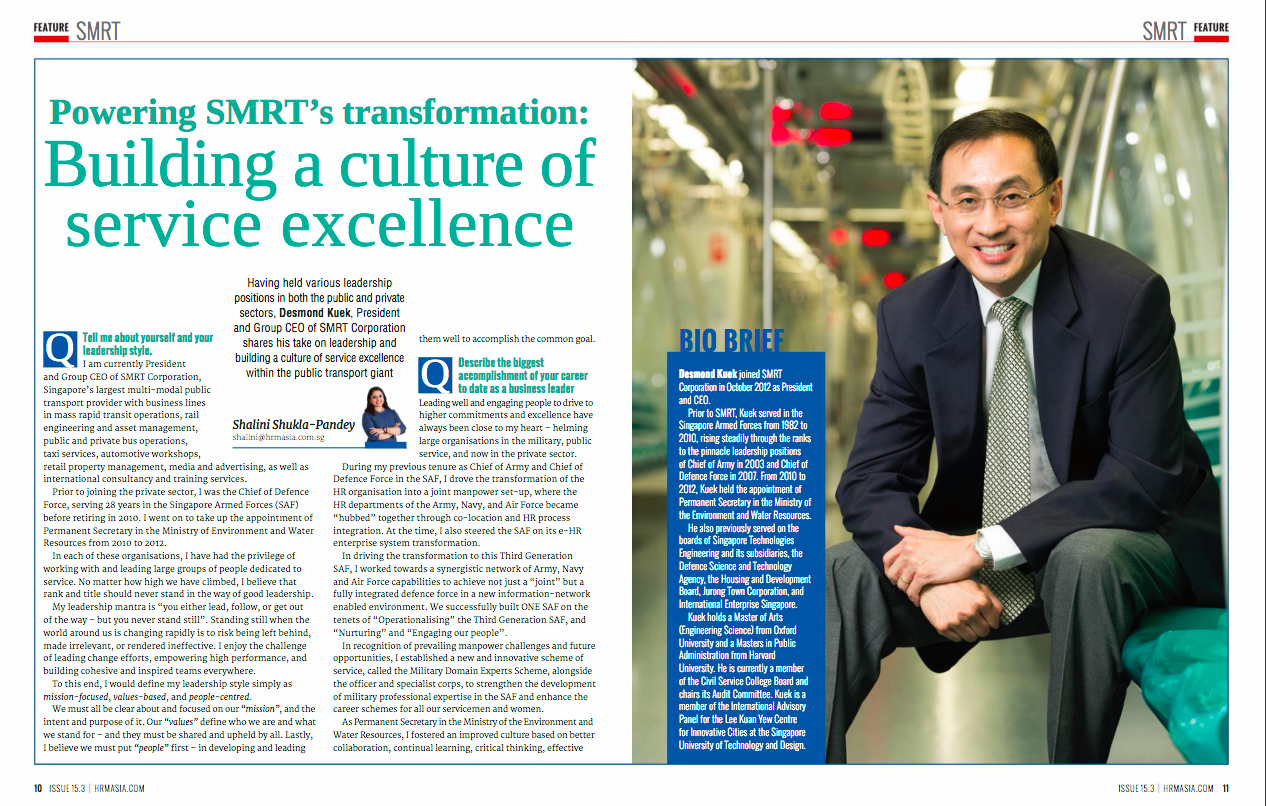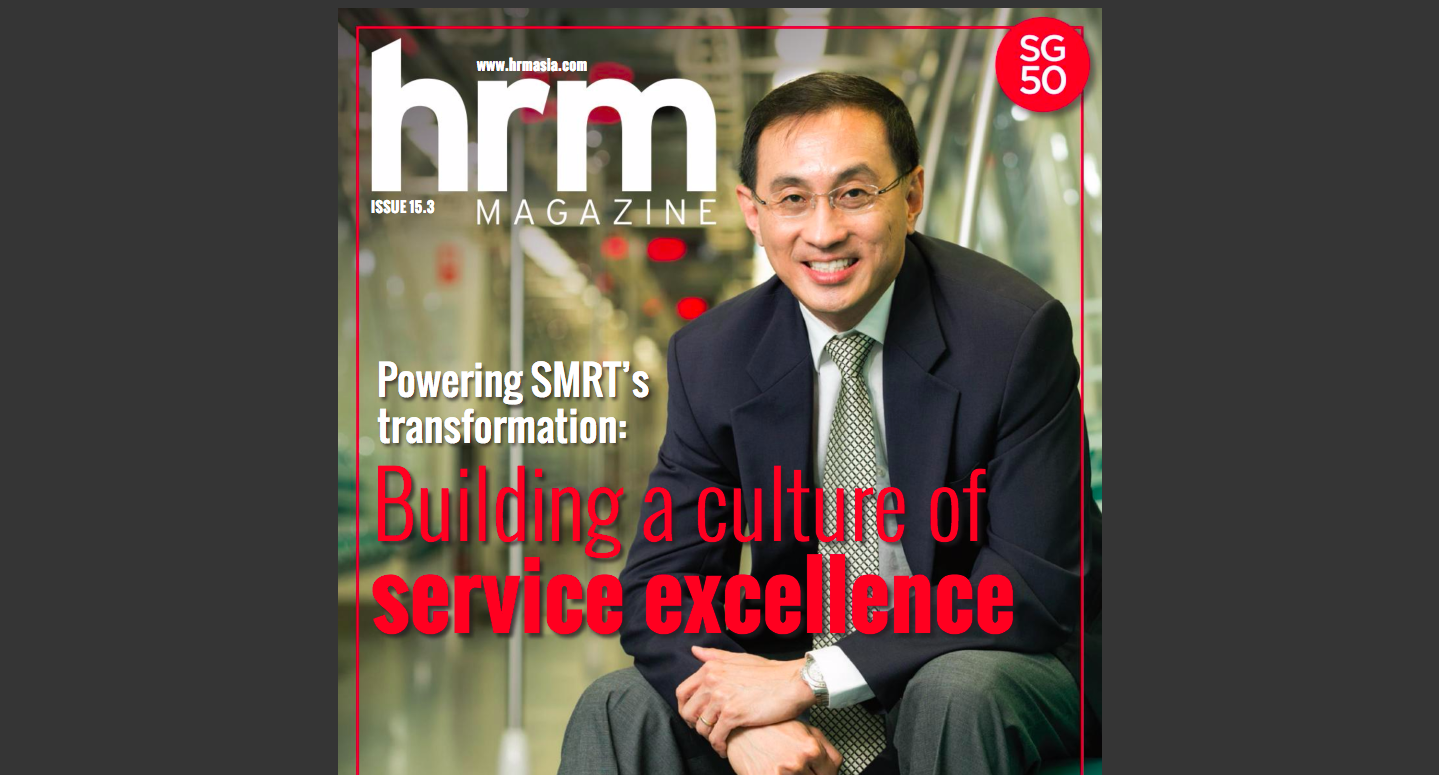It would likely be fair to use the word "beleaguered" on the man at the helm of public transport operator SMRT.
And there's probably no doubt on anyone's mind that this period won't be looked back on by SMRT CEO Desmond Kuek as a highlight in his tenure there.
Having fronted several recent press conferences alongside Transport Minister Khaw Boon Wan in response to a spate of really bad-looking disruptions and frightening train accidents that happened wayyyy too close together for anyone's comfort, Kuek found himself admitting, in the first one on the October 7 flooding incident, to "deep-seated cultural issues" that has "needed more time than anticipated to root out".
Here's what he said specifically about his company's culture:
“There has been criticism about SMRT’s work culture. Indeed, many of our major disruptions in the past have been attributed, in some part, or all, to human error or failure. We regret that this is so.
Much progress has been made with the inculcation of a positive work culture, but there remain some deep-seated cultural issues within the company that has needed more time than anticipated to root out.”
2015 interview on leadership
 Screenshot via HRM Asia magazine
Screenshot via HRM Asia magazine
It is at this juncture that we wish to share details of an interview he gave to HRM Asia magazine — a human resources industry publication — back in March 2015.
In it, Kuek talked about his achievements at the helm of the Singapore army and defence force, as well as a two-year stint as permanent secretary — basically, the highest-ranking position in a government ministry that isn't a political office— in the Ministry of Environment and Water Resources, prior to his appointment at SMRT in 2012.
Much of the interview centered on his first three years there, since this interview was done two years ago.
Here are some of the more interesting bits from the three-page story:
1. His description of the atmosphere when he first joined
Kuek said he joined SMRT at "a rather dramatic time", and talked about how he made attempts to connect with "all levels of the hierarchy at SMRT" from the beginning — for instance, sending an email seeking feedback from all of his employees on how to improve things at the company.
"It was a rather dramatic time when I joined SMRT as CEO in October 2012. Not everything that happened was positive but it all created an important lesson that we must continually improve and excel. However, the company had very strong foundations and a workforce that was proud, competent and committed. So amidst change, we looked for order and amidst the order that we had grown accustomed to over our long and proud history, we identified areas to change."
[related_story]
2. His key priority: "a new level of service excellence"
Kuek said one of the key challenges he kept in view when he joined SMRT was in building trust and confidence with all of its stakeholders: the public, commuters, regulatory authorities, shareholders and employees.
To this end, he said his priority effort was in inspiring "a new level of service excellence... (which) involves leadership at all levels to set the stage and demonstrate by personal example the kind of positive culture and experience we want for our people and customers."
How to make this happen? Kuek detailed a slew of training programmes and initiatives aimed at all levels of the company. At the time, he said all these would be completed by that same year.
3. "An environment conducive to constructive feedback"
Kuek talked about a new (at the time) Industrial Relations and Employee Engagement department in SMRT's human resources team, set up "to promote extensive engagement between management, union and staff."
"By putting in place multiple channels of communication for staff engagement, my management team and I have fostered an environment that is conducive to constructive feedback, continual learning and effective collaboration across organisational lines."
He also described employee engagement levels as "high", citing figures from an employee satisfaction survey that said 90 per cent were proud to be in SMRT, while 82 per cent felt sustainably engaged with the company.
4. His leadership style
Kuek described it in three phrases: mission-focused, values-based and people-centred. He also has a mantra, which is "You either lead, follow, or get out of the way — but you never stand still."
"Standing still when the world around us is changing rapidly is to risk being left behind, made irrelevant or rendered ineffective. I enjoy the challenge of leading change efforts, empowering high performance, and building cohesive and inspired teams everywhere."
At SMRT, Kuek said he has placed an emphasis on nurturing and engaging people, and that under his leadership, his management team has been committed to learning from experiences he describes as "dramatic", and to stay "ready and resilient" against rapid change taking place.
"We have gained considerable momentum across the company with many important initiatives to bring about improvements in structures, processes and culture. I believe my role as CEO is to continue to set the pace and direction of these efforts and create the climate, culture, and context for embracing and affecting change that will lead to attaining and upholding our vision, mission and core values."
Fascinating, when read in today's context — Kuek has been at the helm of SMRT for five years now. Plenty to think about.
Related articles:
Top photo: Screenshot via HRM magazine
Here's a totally unrelated but equally interesting story:
Mums share their experience in helping their kids go cashless
If you like what you read, follow us on Facebook, Instagram, Twitter and Telegram to get the latest updates.

